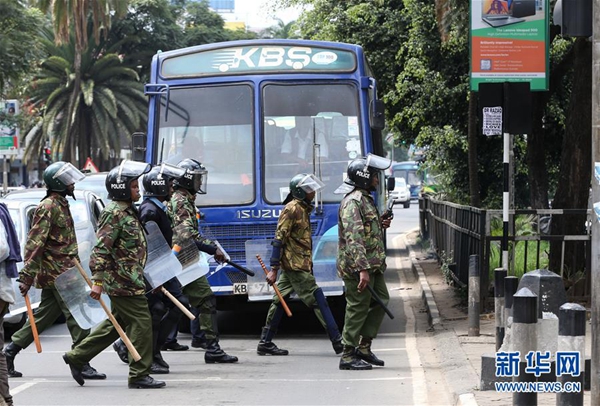Kenya election: tradition trumped by innovation?
- By Earl Bousquet
 0 Comment(s)
0 Comment(s) Print
Print E-mail China.org.cn, September 12, 2017
E-mail China.org.cn, September 12, 2017
|
|
|
Police patrol in the central business district in Nairobi, Kenya on May 23, 2016. [Xinhua] |
The historic and controversial Supreme Court ruling reversing the results in Kenya’s recent presidential election is a game-changing shocker surprising even the opposition that had sought it.
It’s the first time an African court has taken such a decision, which is being studied across the continent and the rest of the world.
President Uhuru Kenyatta, Opposition Leader Raila Odinga, the head of the nation’s Electoral Commission – and lawyers representing them all – have already started offering differing, but dire interpretations of the political fallout from the annulment and the court’s insistence on a new election within 60 days.
The full decision is not officially expected for at least 21 days after judgment.
However, essentially, one of the main reasons offered by four of the six consenting judges in the majority ruling is that too many certified results of the manual count were unavailable for opposition verification when the final result was announced.
An interesting sideline of the court judgment is the involvement of technology in the counting process of the last election.
After earlier elections resulted in violence and deaths during the long counting period, Kenya adopted recommendations to introduce biometric voter registration, electronic voted identification and a results transmission system.
The real-time transmission of results through the technological input was supposed to reduce the possibility of voter fraud during the manual counting process. However, it seems it backfired. Odinga claimed the entire system was “hacked,” which was rejected outright by the Electoral Commission.
However, while the new sophisticated, computerized counting process approved by all parties indeed hastened the count, the laborious process of delivery of manually certified ballots from polling stations across the vast country remained slow.
As a result, while the Electoral Commission was pleased with the validity of the speedily delivered results, the opposition found itself unable to verify the computerized tally – and followed-up on its earlier threat to challenge the results in court.
The court decision is final and the entire electorate will have to once again repeat the agonizing process of choosing one of two equally strong parties divided by tribalism and seemingly permanently separated by related historical political antagonisms.
Concerns are already being expressed in Kenya about the distinct possibility of a real tribal war resulting from a re-election using the same means and methods.
There are suggestions that either the entire system be fully computerized (from beginning to end, across the nation), or that enough time be given for certification of manual counts before a final result is announced.
Nonetheless, this is a universal precedent of a case where electoral tradition has been trumped by innovation, with the unexpected result of total cancellation of the entire election.
Earl Bousquet is a contributor to china.org.cn, editor-at-large of The Diplomatic Courier and author of an online regional newspaper column entitled Chronicles of a Chronic Caribbean Chronicler.
Opinion articles reflect the views of their authors, not necessarily those of China.org.cn.







Go to Forum >>0 Comment(s)